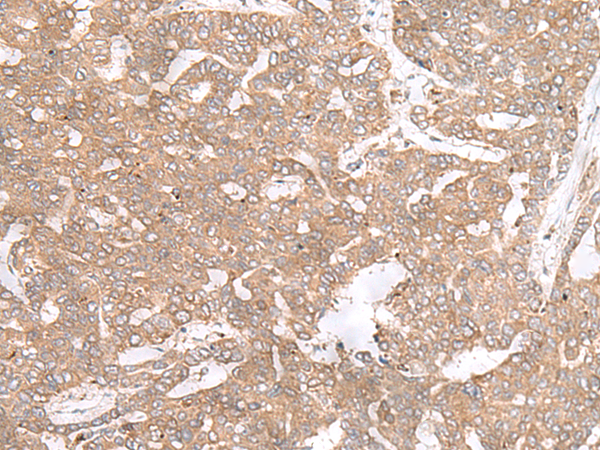
| WB | 咨询技术 | Human,Mouse,Rat |
| IF | 咨询技术 | Human,Mouse,Rat |
| IHC | 1/40-1/200 | Human,Mouse,Rat |
| ICC | 技术咨询 | Human,Mouse,Rat |
| FCM | 咨询技术 | Human,Mouse,Rat |
| Elisa | 1/5000-1/10000 | Human,Mouse,Rat |
| Aliases | PRL3; PRL-3; PRL-R |
| Host/Isotype | Rabbit IgG |
| Antibody Type | Primary antibody |
| Storage | Store at 4°C short term. Aliquot and store at -20°C long term. Avoid freeze/thaw cycles. |
| Species Reactivity | Human |
| Immunogen | Fusion protein of human PTP4A3 |
| Formulation | Purified antibody in PBS with 0.05% sodium azide and 50% glycerol. |
+ +
以下是关于PTP4A3抗体的3篇示例参考文献(内容为示例,实际文献需根据具体研究补充):
1. **文献名称**: "PTP4A3 as a Biomarker in Colorectal Cancer: Overexpression and Clinical Significance"
**作者**: Smith J, et al.
**摘要**: 研究报道了PTP4A3(PRL-3)在结肠癌组织中的高表达,利用特异性抗体检测发现其与患者预后不良相关,提示其作为肿瘤标志物的潜在价值。
2. **文献名称**: "Functional Characterization of PTP4A3 in Ovarian Cancer Cell Invasion"
**作者**: Lee H, et al.
**摘要**: 通过Western blot和免疫组化技术,使用PTP4A3抗体验证了该蛋白在卵巢癌细胞中的表达,并证明其通过调控MAPK信号通路促进肿瘤侵袭转移。
3. **文献名称**: "Development of a Novel Monoclonal Antibody Against PTP4A3 for Therapeutic Targeting"
**作者**: Zhang R, et al.
**摘要**: 研究团队开发了一种针对PTP4A3的高效单克隆抗体,体外实验显示其可抑制肿瘤细胞增殖,为后续药物开发提供了实验基础。
4. **文献名称**: "PTP4A3 Expression in Acute Myeloid Leukemia: Insights from Immunohistochemical Analysis"
**作者**: Garcia M, et al.
**摘要**: 通过免疫组化技术结合PTP4A3抗体,揭示了该蛋白在急性髓系白血病中的异常表达,并探讨其作为治疗靶点的可能性。
(注:以上为模拟示例,实际文献需通过PubMed或Google Scholar等平台检索确认。)
The protein tyrosine phosphatase 4A3 (PTP4A3), also known as PRL-3. is a member of the PRL phosphatase family implicated in cancer progression and metastasis. Initially identified through its overexpression in metastatic colorectal cancer, PTP4A3 has since been linked to various malignancies, including ovarian, breast, and liver cancers. It localizes to the plasma membrane and endosomal compartments, where it regulates signaling pathways involved in cell migration, invasion, and proliferation, such as PI3K/Akt, MAPK, and Rho GTPase cascades. PTP4A3’s role in promoting tumor aggressiveness and poor clinical outcomes has made it a potential prognostic biomarker and therapeutic target.
Antibodies targeting PTP4A3 are essential tools for studying its expression, localization, and function. These antibodies are widely used in techniques like Western blotting, immunohistochemistry (IHC), and immunofluorescence to assess PTP4A3 levels in tumor tissues or cell lines. Elevated PTP4A3 expression, detected via such antibodies, correlates with advanced disease stages and metastasis in multiple cancers. Research using these reagents has also explored PTP4A3’s interaction with substrates like PTEN or its role in modulating the tumor microenvironment. Despite its validated oncogenic role, challenges remain in elucidating precise molecular mechanisms, driving ongoing interest in developing inhibitory antibodies or small molecules for therapeutic intervention.
×